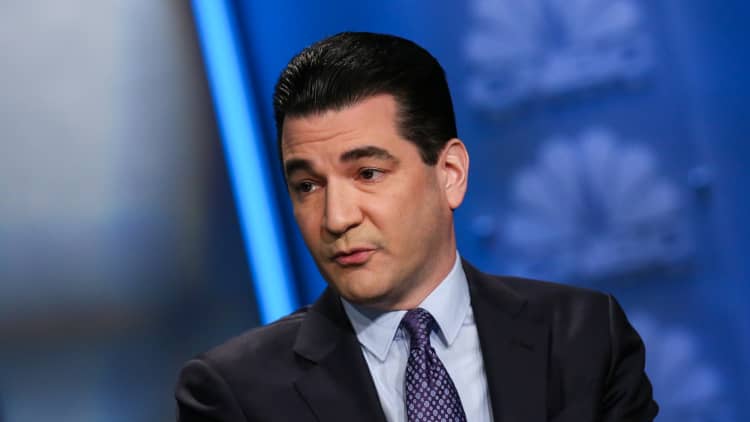The Food and Drug Administration on Monday tightened rules for coronavirus antibody tests, ordering manufacturers to submit emergency use authorization forms and data proving the tests work within 10 days or face possible removal.
Serological, or antibody, tests can indicate whether a person has had Covid-19 and was either asymptomatic or recovered.
So far, 12 antibody tests have been authorized by the FDA for emergency use, and more than 250 tests are currently the subject of a pre-EUA or EUA review, FDA Commissioner Stephen Hahn told reporters Monday during a press briefing.
The federal agency is also providing performance threshold recommendations for antibody test developers and is introducing a streamlined process to support EUA submission forms, Hahn said.
"High-quality antibody tests or serologic tests can help us understand a person and population's exposure to Covid-19," he added.
U.S. officials and corporations across America are pouring money into antibody testing, hoping it will give people the confidence to return to work and reopen parts of the economy. President Donald Trump has recommended states use the tests as they start relaxing some of the strict social distancing measures imposed to combat the pandemic, which has infected more than 1.1 million people across the United States, according to data compiled by Johns Hopkins University.
Since the FDA issued its initial antibody test policy in mid-March, the agency said it has become aware of "a concerning number" of commercial serology tests being promoted inappropriately, including for diagnostic use, or performing poorly. The FDA declined to comment on specifically what tests were giving inaccurate results.
The FDA's policy update comes too late as faulty and inaccurate tests have already flooded the market, said Rep. Lloyd Doggett (D-TX), chairman of the House Ways and Means Health Subcommittee.
"The FDA's 'anything goes' policy for antibody testing has been an invitation for fraud with tests whose results currently offer little value, while misinforming important risk management decisions," Doggett said in a statement, adding that the updated policy is "excuse-making."
"The FDA has not outlined what oversight actions it will take to remove fraudulent tests and recoup payments made by abused consumers," he said.
Isaac Bogoch, an infectious disease specialist and professor at the University of Toronto, called the agency's move "smart," adding some of the tests were extremely unreliable and could create a dangerous "false sense of security" for some Americans.
"I'm glad there's a sense of urgency for reining this in," he said. "Some of these tests were producing false positives or false negatives. ... Many of them were uninterpretable."
Dr. Scott Gottlieb, the former FDA commissioner, told CNBC that the tests have a high false-positive rate, making it difficult to know whether a single result is credible. He said the likely accuracy of the test increases if the same person gets two positive determinations in a row.
"Quite frankly, if it was me, I would repeat it three times," said Gottlieb, a CNBC contributor who sits on the boards of Pfizer and biotech company Illumina. "I know they're expensive, but I wouldn't put confidence in any one test."
Hahn said Monday that the FDA had intended to provide "regulatory flexibility" for manufacturers "given the nature of this public health emergency and an understanding that the tests were not to be used as the sole basis for Covid-19 diagnosis."
"And I just want to emphasize that that fact remains true today," he added. "These tests are not be used as the sole basis for Covid-19 diagnosis."




